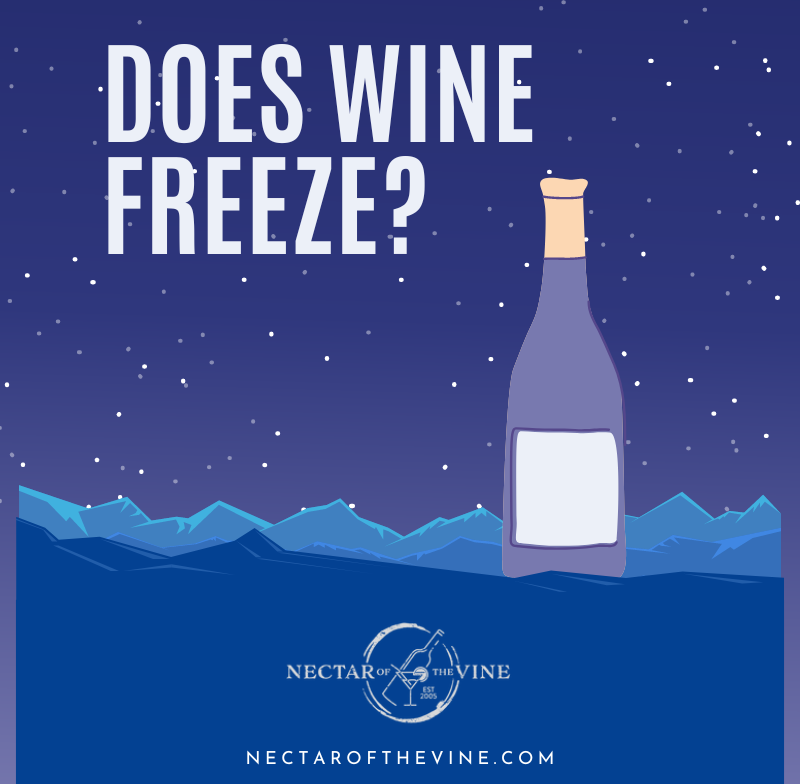Does Wine Freeze? Exploring the Science Behind Wine Slushies
6th Jul 2023

As anyone wine lover who has ever accidentally found a frozen bottle of wine in their freezer can tell you, wine does indeed freeze! While wine has a lower freezing point than water, it will take on a slushie texture or even turn solid at the ideal temperature.
But rest assured that there's no need to panic the next time you find a frozen bottle of leftover wine in your fridge. Frozen wine is perfectly safe to drink and many people even freeze it on purpose to create a delicious wine slushie.
In fact, wine freezing has become a bit of an art of late, particularly among wine slushie connoisseurs. Join us as we explore why wine freezes, how it affects the wine's flavor and alcohol content, and everything you need to know to create a delicious wine slushie.
Why Does Wine Freeze?
The short answer is that wine will freeze because it is, after all, a liquid. Despite contrary belief, any liquid will begin to freeze at a low enough temperature - with one notable exception.
As it turns out,liquid helium is the exception to the rule, as quantum fluctuations can stabilize it at absolute zero. So go ahead and empty any liquid helium you had lying around in your ice cube tray and make way for wine cubes instead!
Does Prosecco Freeze?
While Prosecco does freeze at around the same temperature as the average bottle of wine, it requires an added layer of caution. While it may contain roughly the same alcohol content (around 12.5%) as a bottle of wine, Prosecco also contains carbon dioxide, which is what creates its trademark bubbles.
But carbon dioxide also expands when it reaches its freezing point, which can cause the cork to burst or even the bottle to explode if it's stored at a cold temperature for long enough. For this reason, you may want to consider creating a large Prosecco wine ice cube in a sealed Tupperware container or even using an ice tray if you plan to make a wine slushie the same day.
Understanding the Science of Wine Freezing
Wondering why you can freeze wine in your freezer but not hard liquor? The short answer is that wine will begin to solidify at a much higher freezing temperature than hard liquor because it has a lower alcohol content.
While even a bottle of pure ethanol alcohol will freeze at a low enough temperature (-173 degrees Fahrenheit), most home freezers simply don't get that cold. Given that the average glass of wine only contains around 11 - 13 percent alcohol, as opposed to the higher alcohol content (95%) of a bottle of Everclear, wine's freezing point is much easier to attain.
There are actually several different factors that come into play when determining the freezing point of different types of alcohol. The temperature at which a bottle of wine will freeze can depend on everything from its alcohol and sugar content to the style of the wine and the type of grapes that were used to make it.
How Does Alcohol Affect the Freezing Point of Liquids?
Alcohol content plays a huge factor in determining the point at which a bottle of wine will begin to transform into a wine popsicle. As opposed to water, which will freeze at 32°F, pure alcohol has a much lower freezing point of around -175°F.
Considering that alcoholic beverages are largely a mixture of water and alcohol, the freezing points of different drinks will depend on their alcohol content. This is usually measured by ABV or alcohol by volume, which measures the overall percentage of alcohol in a wine bottle.
The average ABV of wine is usually in the range of 11 - 13%. But some wines have an ABV as low as 5.5% or as high as 25%. The average bottle of wine will begin to freeze at around about 22 °F, but the temperature may vary if the ABV is higher or lower.
A low-ABV wine, for instance, may freeze at around 28 F, thestandard freezing temperature for a bottle of beer. Wines with a higher average alcohol content may freeze somewhere in the same range as a bottle of liquor:
40-Proof Liquor (20% ABV) will freeze at around 22 F, while 64-Proof Liquor (32% ABV) will freeze at around -10 F.
How Does Sugar Affect the Freezing Point of Liquids?
The amount of sugar a bottle of wine contains can also affect its freezing point. This consideration may also come into play if you're using a wine slushie mix that contains sugar for flavoring and sweetness.
As you may or may not remember from science class,adding sugar to water can slightly lower its freezing point. In scientific terms, this is because the sugar molecules run around through the water molecules, making it harder for them to create hydrogen bonds and solidify.
Grape Varieties & Wine Styles
With the above two factors in mind, a rule of thumb is that lighter-bodied wines, which have lower alcohol percentages, will freeze the easiest. While you can still use the heavy-bodied section of your wine cellar to create wine smoothies, just be aware you may need to set your freezer at a lower temperature.
The level of tartaric acid found in a wine's tartrate crystals and the presence of tannins can also lower a wine's freezing temperature slightly. But neither plays nearly as large a role as the amount of alcohol or sugar a bottle of wine contains.
How to Make Wine Slushies Freeze?
Rest assured that there's no need to be alarmed at the amount of science that goes into turning your favorite pinot noir into refreshing wine slushies! AtNectar of the Vine, we design each of our mixtures to help you achieve just the right balance of sugar, liquid, and alcohol content for a wine slushie with perfect consistency.
You'll also find handy mixing directions for each of our products that take the guesswork out of preparing each of our wine frappes' and slushie mixes. In general, there are two different ways to go about mixing them with your favorite red wine, white wine, or even liquor.
The Freezer Method
Mix your favorite wine with one of our slushie mixes, pop it in the freezer for 4- 6 hours, and enjoy! Don't worry, each of our recipes includes the ideal freezing time.
The Quick Ice Fix
Whether the sugar and alcohol combo of your mix is making it harder to freeze or if you simply want to take your drink from room temperature to frozen faster, the answer is no further than the nearest ice bucket. Pull out a blender with at least a 2-quart pitcher and create your mix as normal.
Then begin blending in two ice cubes at a time until you reach a total of six. The result will be a delicious slushie beverage that you can enjoy immediately.
Tips and Tricks for the Perfect Wine Slushies
Ready to transform that unassuming bottle of wine into a delicious frozen treat? Here are some tips and tricks to help you make the most of your favorite mixes.
Wine Varieties
One question we often get concerns the best types of wine to use with our mixtures. The truth is - it depends.
We offer a wide range of flavors in an effort to ensure we'll always have something that's sure to delight everyone. Additionally, as you browse through our recipes, you'll discover that the same mix sometimes offers multiple recipe options to choose from.
That said, it's hard to go wrong using a dry white wine like Chardonnay with almost any of our mixtures, which come with their own built-in sweeteners. Using dry wines tends to even out the flavors nicely and keep your drink from turning out overly sweet.
There are always exceptions to the rule, of course, as some of our mixes like Chocolate Martini, Sangria, and Warm Mulling Spice go best with a dry red wine. Rest assured you can always consult our recipes to find plenty of hints about what types of wine work best with each mix.
Timing
When it comes to the art of the wine slushie, timing is everything. If you plan to use the classic freezer method, you should generally plan on leaving at least 4 hours for the freezing process.
If a certain mixture requires longer, we'll be sure to let you know in the recipe section. Each recipe also includes blending directions in case you want to cut out the freezer entirely.
Add Your Own Creative Twists
Many of our recipes also include suggestions for garnishes or creative twists, but don't be afraid to experiment and add your own! If you find yourself with leftover wine slushies, simply pop them back into the freezer until you're ready to enjoy them.
Most should retain their flavor for several days to a week. You might also consider using your leftovers to make wine slushie ice cubes, which you can blend and enjoy on demand.
Now, Enjoy Some Wine Slushies
Now you not only know that wine does indeed freeze but some of the scientific reasons why! Feel free to pull out your newfound knowledge the next time you want to impress over a mid-day wine slushie conversation.
If you want to create the perfect wine slushie for your flavor profile without turning your kitchen into a science lab, we've got you covered. Head to Nectar of the Vine to check out our wide selection of mixtures that can take your favorite bottle of wine to the next level.

